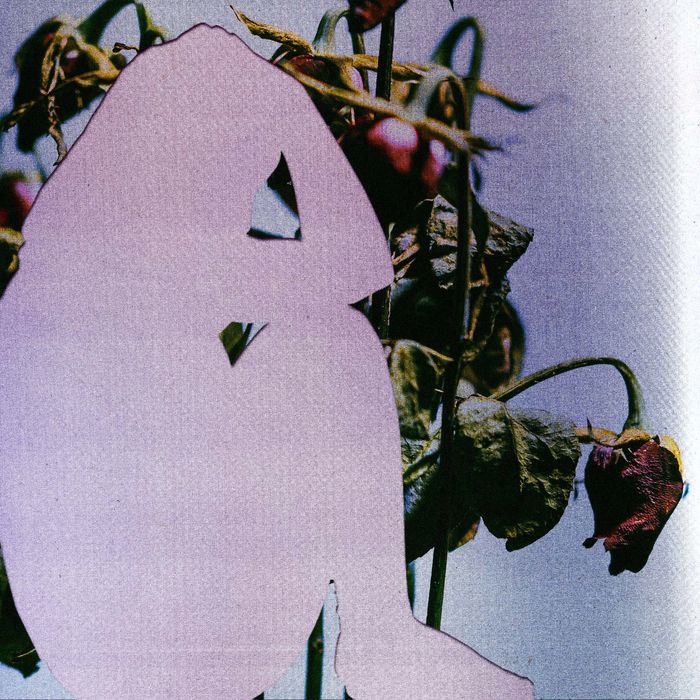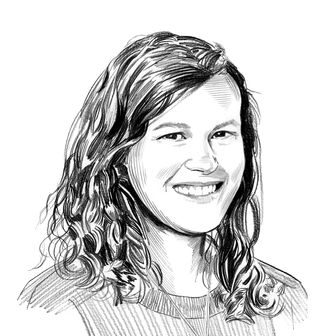
For as long as I can remember, I was sure that I wanted kids. When I saw other women with their children, I felt envious. I craved the intimacy of motherhood: the bodily closeness, the easy laughter, the knowingness that comes from the sheer amount of time spent together. I wanted to feel a small person cling to me and know I was needed. My desire was deeper than logic. Even with all the unsparing accounts of parenting I had read, I never truly allowed myself to consider that I wouldn’t like being a mother or that I wouldn’t be good at it. I certainly never imagined that the experience would alter my brain in ways that would make me no longer recognize myself.
At first, things felt good — too good. In the days after my daughter was born, I barely slept, but I didn’t feel the exhaustion I’d been warned about. “I think I’m running on crazy adrenaline,” I told friends. As I nursed in the middle of the night, my mind was buzzing. When she napped, I sent photos and rapid-fire texts to friends and acquaintances. I couldn’t believe how happy I felt. I was full of ideas and plans for the future, from rooms I would redecorate to books and essays I would write.
I could tell something was different, but it made sense to me. I was suddenly less anxious and more productive because now that I was a mother, I had to be. When I’d struggled to breastfeed at the hospital, the nurses told me to relax and trust that my body knew what to do. Now, I could feel my hormones kicking into gear, helping me become the best version of myself.
The people around me did not see it that way. My husband told me I seemed like I was on drugs. When I started posting on Instagram for the first time in years, a close friend said it didn’t seem like me. I was defensive. I’d barely been a mother for a week. Why was everyone being so critical? The worst was when people would tell me that I needed to sleep. Of course I wanted to sleep! But the baby was losing weight, and I’d been told to breastfeed every two to four hours, around the clock.
As the days went on, I started to find the intensity of my mood swings unnerving. Eventually, after I found myself screaming at my husband that he was gaslighting me, I called my OB. Sitting in her office the next day, I took deep breaths, reminding myself to talk slowly. I explained that people had told me I was acting manic, and I confessed that sometimes, in the middle of the night, I felt like I was hallucinating. Still, part of me hoped this was normal. Didn’t most people feel a little on edge after having a baby? I was relieved when my doctor didn’t seem too concerned. She gave me a lecture about sleep deprivation and wrote down the number of a therapist on a Post-it.
I went home feeling vindicated, but two days later, I was in the emergency room. My friends drove all the way from New York to trick me into going, convincing me it would just be a quick psych eval and that we’d be together with my daughter the whole time. It was October 2020, and Rhode Island — where my husband and I had decided to give birth in order to be closer to my family — was in the middle of a COVID surge. The ER was the last place I wanted to be. The nurses kept telling my husband he needed to leave because of COVID restrictions, prompting me to yell that I had just given birth and was extremely traumatized. My blood pressure was so high they decided to treat me for preeclampsia.
I had brought my notes on what I was experiencing, which I handed to a doctor. “The New Me: Motherhood as Creative Breakthrough,” I wrote, followed by a list of symptoms that may as well have been the DSM criteria for mania. “Racing thoughts. Extremely hormonal. Rage. Frustration. Mania. Ambition. Extreme ambition. Extreme creative inspiration and energy. Extreme happiness. Calm, confident, and in control.” It went on. “Wow,” the doctor said finally, before informing me that I was above his pay grade.
I wanted to know when I would be able to see my daughter, who was two weeks old. It had already been a few hours, and I needed to breastfeed. I was told that because of COVID, it wasn’t safe for her to be in the ER. I asked if they could move me to a different part of the hospital so I could be with her. They said they would send a breast pump.
Soon enough, there was a man in my room recommending that I go to the psych ward. When my husband agreed, I could tell I didn’t really have a choice. They told me to hand over my laptop, phone, and wedding ring. Terrified, I started howling, then begging. My husband was crying too. “It’s just for a few days,” he pleaded. Eventually, I passed out; they had me hooked up to an IV drip of Ativan to calm me down.
There were no open beds in the psych ward, so I spent the next few days bouncing among random hospital departments. I was becoming increasingly distressed that no one would tell me when I would be able to leave or see my daughter. When I told the doctors I needed to be with her, they repeated that it was impossible because of COVID. I resented the implication that I was putting my daughter’s health at risk by wanting to see her. She had just spent three days in my hospital room following her birth, when I was told the most important things for her were breastfeeding and skin-to-skin contact. I had a million questions. Could I see her outside? Could I get transferred to a different hospital? Could I get an at-home nurse? Was COVID really the reason I couldn’t see my baby? Did the doctors think I was a risk to her? Did my family?
I’ve since learned that in the U.S., most mothers who require inpatient psychiatric care after giving birth are separated from their babies in the process. I was diagnosed with postpartum psychosis, a serious mental illness that occurs following about one in every 500 births. While it’s most common among women who have a history of bipolar disorder — which I was subsequently diagnosed with — it’s not unheard of to have a first manic episode after giving birth, when hormones, stress, and disrupted sleep create a perfect storm of triggers.
I was released from the hospital after just a few days. I suspect my early discharge may have been related to the fact that I would not shut up about the cruelty of being separated from my daughter. I was confused about a lot of things, but not that. They sent me home with a prescription for a mood stabilizer and an intake appointment for a therapy program. Giving birth in Rhode Island turned out to be a lucky choice: I was admitted to one of the only mother-baby day-hospital programs for perinatal mental health in the country.
Still, even with therapists I trusted, it was weeks before I started to feel like myself again. At first, the antipsychotics made me drowsy, then I was too restless to ride in a car. I cycled through different prescriptions, mildly manic the whole time. I didn’t have the patience to watch a TV show, let alone to breastfeed. I was in awe of my daughter, but I found spending long amounts of time with her painfully boring. It was a relief to pass her off to my husband while I flitted around to knit a pair of booties or make a mood board for the house I wanted to renovate. When I saw how effortlessly my husband enjoyed our daughter, I felt deeply ashamed. I had been the one who was sure we should have a baby. The longing I felt for my old life scared me.
Things got better once I started taking lithium. But as my mood evened out, I was disturbed to realize just how strangely I’d been acting. My phone and laptop were full of frantic texts, meandering emails, and an astounding number of Google docs. My closet was overflowing with craft supplies and impulsive purchases (multiple pairs of clogs, a lifetime supply of Uniqlo turtlenecks, a bike). I was embarrassed by all of it.
I knew that being manic wasn’t my fault, but the hardest part was coming to terms with the fact that during the early weeks of my daughter’s life, I had been distracted and delusional. I had no prior history of mental illness and was shaken to discover how thoroughly my brain had betrayed me. While manic, I was convinced I was thriving as a mother. It was painful to think back to how happy I’d been, how calm and at ease I’d felt following my daughter’s birth. Had any of it been real?
I had spent years yearning for motherhood and was humiliated by the ways I had failed. It was awful to learn that the people close to me had recognized that I was too ill to care for my baby and to accept that they had been right. When my husband left me alone with my daughter for the first time a few weeks after I got home from the hospital, I was amazed he trusted me; I wasn’t sure I trusted myself. Talking with friends who brought up breastfeeding, I was too ashamed to admit I’d had to stop when I started taking lithium. I had expected to feel different after having a baby, but I could barely recognize my life.
I was dreading going back to work, but things actually got easier once I did. While I worried about sending an infant to day care in a pandemic, having regular child care helped me settle into life as a mother and start to actually enjoy it. As time has passed, it has become easier to see my manic episode for what it was: a weird and hard couple of months. When my husband and I talk about it now, we often laugh about the erratic and grandiose things I did and said, and in those moments I feel closer to him than I did before.
There are still times where the memory of what happened makes me feel raw and alone. But I came out with a better understanding of who I am. Even at the time, it was clear to me that the euphoria I felt after my daughter’s birth was rooted in my excitement about becoming a mother. My comedown forced me to recognize how distorted my reality had become, but the things I’d most been excited about — both my daughter and my creative ambitions outside of her — were still there after the mania faded, albeit in less exaggerated forms.
A blessing and curse of early parenthood is that things do change. A year ago, my daughter was just learning to sit up; now, she dances when she hears the jingle of the ice-cream truck and begs to go outside. By the end of a day with her, I’m exhausted, but when she rests her head on my chest, being her mother feels just as good as I used to imagine it would. I’m more confident as a parent now, but the years ahead still feel full of uncertainty. I hope I can help my daughter learn how to live with it.





